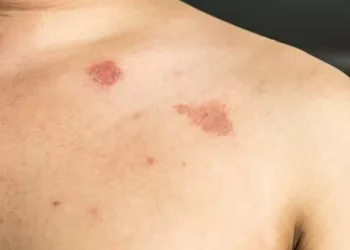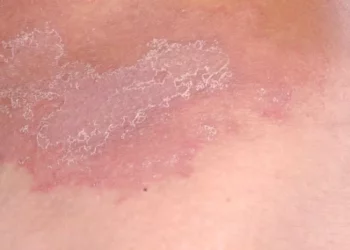Ringworm is a common skin infection that can affect various animals, including dogs. It is caused by a fungus, not a worm, and it can be transmitted from animals to humans. In this article, we will explore whether dogs can carry ringworm, how it spreads, its symptoms, and how it can be treated and prevented.
What Is Ringworm?
Ringworm is a fungal infection that affects the skin, hair, and nails. The name “ringworm” comes from the circular, ring-like appearance of the rash that often develops on the skin. Despite the name, ringworm has nothing to do with worms. It is caused by a group of fungi known as dermatophytes.
There are several types of dermatophytes that can cause ringworm in both humans and animals. The most common species that affect dogs are Microsporum canis, Trichophyton mentagrophytes, and Microsporum gypseum. These fungi thrive in warm, moist environments, which is why they are commonly found on the skin, hair, and nails of affected animals.
Can Dogs Get Ringworm?
Yes, dogs can get ringworm. Although it is not as common as other skin conditions, ringworm is still a possibility for dogs. Certain breeds and young or immune-compromised dogs may be more susceptible to developing the infection. Dogs typically get ringworm when they come into contact with infected soil, other animals, or contaminated surfaces.
When a dog has ringworm, it can spread the fungal infection to other animals and even to humans. This is why it is important to take immediate action if you suspect that your dog has ringworm. The fungus can be passed on through direct contact or through contaminated bedding, brushes, or other objects.
How Do Dogs Get Ringworm?
Dogs can get ringworm in several ways, including direct contact with an infected animal or contaminated environment. Some of the most common ways dogs acquire ringworm include:
Contact with Infected Animals: Dogs can get ringworm from other infected animals, including other dogs, cats, and even livestock. The fungus can be transferred when animals groom each other, play together, or share spaces.
Exposure to Contaminated Environment: Ringworm fungi can survive for long periods in the environment, particularly in bedding, carpet, and furniture. If your dog comes into contact with these areas, they may pick up the infection.
Contact with Infected Soil: The fungi that cause ringworm can also live in the soil. If your dog digs in contaminated soil, they may get infected.
Immune System Weakness: Dogs with weakened immune systems, such as puppies, elderly dogs, or dogs with other health conditions, are more susceptible to contracting ringworm.
Symptoms of Ringworm in Dogs
The symptoms of ringworm in dogs can vary depending on the severity of the infection. Some dogs may show obvious signs, while others may have a mild case that is harder to notice. Common symptoms of ringworm in dogs include:
Circular Patches of Hair Loss: One of the most obvious signs of ringworm is circular patches of hair loss on the skin. These patches often have a reddish, inflamed border and may be covered with scabs or crusts.
Itching or Scratching: Ringworm can cause itching and discomfort, leading to excessive scratching, biting, or licking of the affected area.
Scaly or Dry Skin: Infected areas may become dry, scaly, or flaky. The skin around the ringworm lesion may appear irritated or inflamed.
Thickened or Crusted Skin: As the infection progresses, the affected areas of the skin may become thicker or develop crusts. The fungus can also cause sores to form on the skin.
Lesions on the Face, Ears, and Paws: Although ringworm can occur anywhere on the dog’s body, it is most commonly found on the face, ears, paws, and tail. These areas are more prone to coming into contact with contaminated surfaces.
Redness and Inflammation: In some cases, the skin around the ringworm lesion may become red and inflamed. This is usually a result of the body’s immune response to the infection.
If you notice any of these symptoms in your dog, it is important to seek veterinary care. Ringworm is highly contagious, and early treatment can help prevent it from spreading to other animals or humans.
How Is Ringworm Diagnosed in Dogs?
If you suspect that your dog has ringworm, your veterinarian will perform a thorough examination. Diagnosis typically involves a combination of the following methods:
Wood’s Lamp Examination: This is a special ultraviolet light that can cause certain species of ringworm fungi to fluoresce. While not always conclusive, a Wood’s Lamp examination can help the veterinarian determine if ringworm is present.
Microscopic Examination: The veterinarian may take a sample of the affected skin or hair and examine it under a microscope. This can help identify the fungal spores that cause ringworm.
Fungal Culture: The most accurate way to diagnose ringworm is through a fungal culture. In this test, a sample of hair or skin is placed in a culture medium and monitored for fungal growth. This test can take several days to provide results but is the best way to confirm the presence of ringworm.
PCR Testing: Polymerase chain reaction (PCR) testing can also be used to detect fungal DNA in the skin or hair samples. This is a more advanced test that is usually used if other diagnostic methods are inconclusive.
How Is Ringworm Treated in Dogs?
Treatment for ringworm in dogs usually involves antifungal medications. Your veterinarian may recommend the following options:
Topical Antifungal Treatment: For mild cases of ringworm, topical antifungal treatments such as creams, ointments, or shampoos may be effective. These treatments should be applied to the affected areas as directed by your veterinarian.
Oral Antifungal Medication: For more severe cases or when the infection covers large areas of the body, oral antifungal medications may be prescribed. These medications work from within the body to fight the infection.
Antifungal Shampoos: Regular use of antifungal shampoos can help treat the infection and reduce the chances of reinfection. It is important to follow your veterinarian’s instructions for bathing your dog to ensure the treatment is effective.
Environmental Cleaning: Since ringworm is highly contagious, it is important to thoroughly clean your dog’s environment to prevent the fungus from spreading. This includes washing bedding, cleaning carpets, and disinfecting surfaces.
Isolation: If your dog is diagnosed with ringworm, it may be necessary to isolate them from other pets in the household to prevent the infection from spreading. This is especially important in multi-pet households.
Preventing Ringworm in Dogs
While it may not always be possible to completely prevent ringworm, there are several steps you can take to reduce the risk of your dog getting infected:
Regular Veterinary Checkups: Routine veterinary visits can help detect health issues early, including ringworm, and ensure that your dog is in good health.
Clean Environment: Keep your dog’s living area clean and dry. Regularly wash their bedding, toys, and grooming tools to prevent contamination.
Avoid Contact with Infected Animals: If you suspect that another animal has ringworm, avoid allowing your dog to come into contact with them. This includes both pets and wildlife.
Good Hygiene Practices: Wash your hands after handling your dog, especially if they have been diagnosed with ringworm. This will help prevent the spread of the fungus to other animals or humans.
Boost Immune Health: Dogs with strong immune systems are less likely to develop ringworm. Ensure your dog is fed a healthy diet, gets regular exercise, and has regular vet visits to maintain good overall health.
Can Humans Get Ringworm from Dogs?
Yes, ringworm can be transmitted from dogs to humans. This is called zoonotic transmission. People with weakened immune systems, such as young children, elderly individuals, and those with existing health conditions, are more at risk of contracting ringworm. To avoid infection, practice good hygiene, especially when handling an infected dog.
Conclusion
Ringworm is a fungal infection that can affect dogs, and it is important to be aware of its symptoms and potential for transmission. Early detection, proper treatment, and environmental cleaning are key to managing ringworm and preventing its spread to other animals and humans. If you suspect that your dog has ringworm, consult your veterinarian for an accurate diagnosis and treatment plan. By taking appropriate steps to manage the infection and maintain good hygiene, you can help your dog recover quickly and reduce the chances of reinfection.
Related topics



























